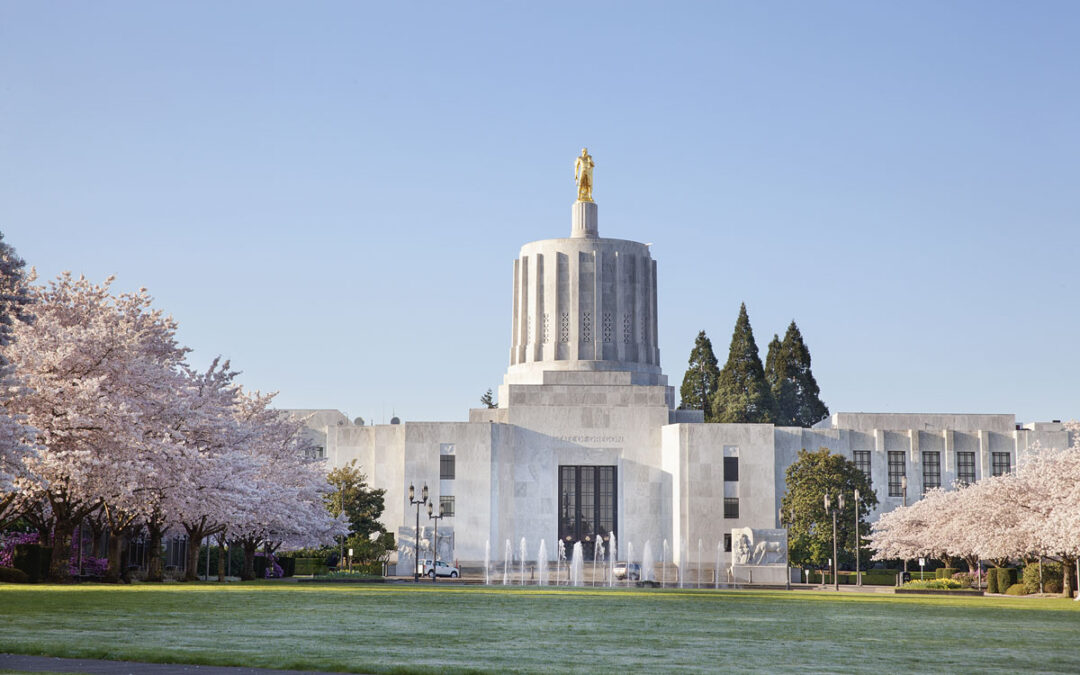
Oct 23, 2023 | AOC Advocacy, Legislative Committee
The Association of Oregon Counties (AOC) Legislative Committee recently adopted eight top priorities for the upcoming 2024 legislative session. These items represent the most pressing policy issues faced by counties across the state, and have been discussed at AOC district meetings, the 2023 AOC legislative retreat in Klamath County, and during AOC policy steering committee meetings since the 2023 legislative session adjourned.
The AOC legislative affairs department, along with county commissioners, chairs, and judges, will advocate in the capitol this spring for the advancement of these priorities. “AOC looks forward to continuing our commitment to solutions-oriented advocacy and collaborating with our partners in the state legislature on policy to efficiently and effectively deliver county services to our shared constituencies,” said AOC Executive Director Gina Nikkel, PhD.
2024 Legislative Session Priorities
Community Development
Advocate for a fast-track process for limited urban growth boundary expansions that significantly increase affordable and workforce housing in all communities experiencing shortages of buildable land.
Governance and Revenue
Address problems arising out of the Tyler v. Hennepin County decision — limit county legal liability and create a standard process for how foreclosure surplus claims are handled.
Health and Human Services
Establish a statutory process and schedule for a cost study of core behavioral health services (local services required in statute).
Mitigate liability risk shift to counties and local system providers for mandated populations (aid and assist, civil commitment, and guilty except for insanity).
Natural Resources
Protect and enhance county authority, funding, and flexibility to support management policies and locally focused policy making processes across the Natural Resources portfolio.
Public Safety
Increase state investment in community corrections funding for the remainder of the 23-25 biennium.
Elevate the county voice in Measure 110 reform, supporting policy modifications that prioritize engagement in substance abuse treatment, provide sufficient funding for county services, and strengthen tools the criminal justice system can use to fight illegal drug use and sales.
Transportation
Advocate for the statutory authority for counties to charge cost-recovery fees for permits issued to utilities for work in the county road right of way.
View the 2024 Legislative Priorities online (PDF)
Contributed by: Mallorie Roberts | AOC Legislative Affairs Director
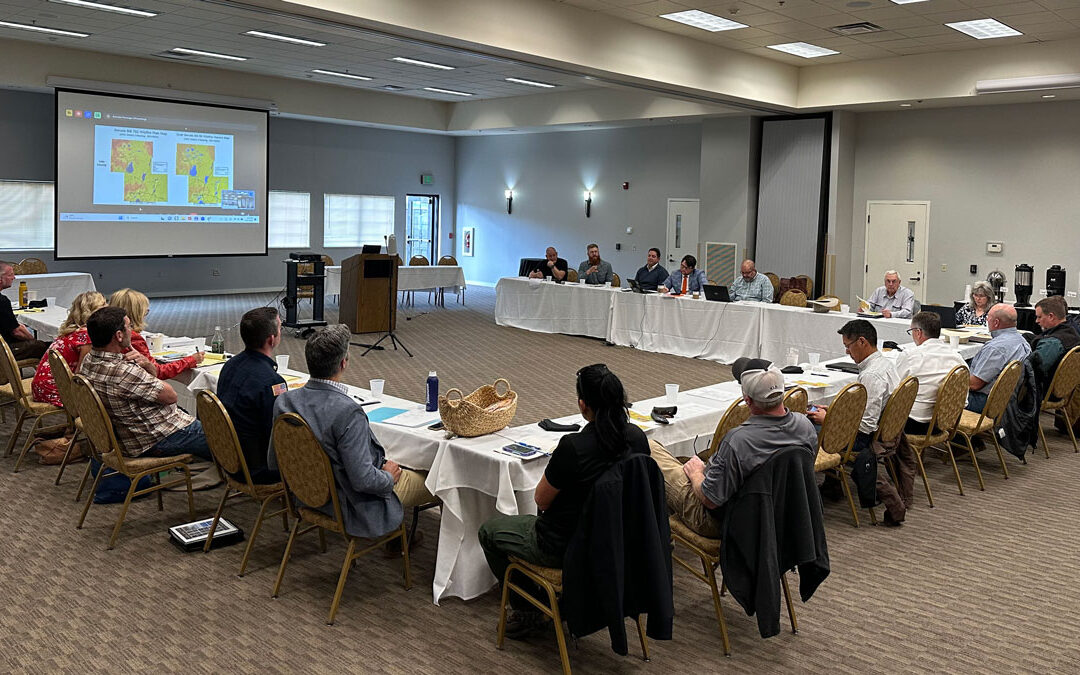
Oct 23, 2023 | AOC Advocacy, Natural Resources
Since the state legislative session adjourned in June, the natural resources portfolio at the Association of Oregon Counties (AOC) has been active implementing AOC’s policy priorities passed during the 2023 session and queuing up work for the upcoming 2024 short session.
Senate Bill 80 Regional Wildfire Hazard Map Meetings
Pursuant to Senate Bill 80 (2023), the Oregon Department of Forestry (ODF) and AOC hosted a series of wildfire hazard map meetings throughout the state, beginning the first week of September and concluding Oct. 11.
The State Insurance Commissioner, Building Codes Division Administrator, Oregon State University, ODF, and the State Fire Marshal traveled to nine locations around the state to engage directly with county commissioners, planners, administrators, and emergency managers. During these meetings, counties and ODF discussed the mapping process, hazard identification methodology, and details of the draft hazard maps. ODF will now begin updating the administrative rules to include information collected during those meetings, as well as factoring in the changes made in Senate Bill 80. Counties will be represented on the rules advisory committee, and can continue to raise issues to ensure necessary changes are considered.
Oregon Department of Fish and Wildlife Sage-Grouse Action Plan Update
The Oregon Department of Fish and Wildlife (ODFW) recently began conversations around updating the Oregon Statewide Sage-Grouse Action Plan. The Sage-Grouse Action Plan designates the core and low-density habitats encompassing the populations and assesses the effects these conservation strategies have on the communities where the bird resides. ODFW conducted public outreach around the habitat map updates and have now turned their attention to the “Greater Sage-Grouse Conservation Assessment and Strategy for Oregon: A Plan to Maintain and Enhance Populations and Habitat.”
AOC staff have been asked to serve on this agency strategy plan update. AOC originally produced the appendix in February 2011. AOC has also been asked to update “Appendix VI: Socio-Economic Profile and Analysis of Oregon Counties included in the Greater Sage-Grouse Conservation strategy for Oregon” by the end of this calendar year. AOC staff has begun this work and is gathering information from the eight impacted counties that are within the current range of the greater sage-grouse in Oregon.
Elk Depredation Program
This session, Rep. Bobby Levy (R-Echo) introduced House Bill 3052 (2023) which would have established a task force on elk and deer damage compensation funding. Although that bill did not receive a floor vote, the House Interim Committee on Agriculture, Land Use, Natural Resources, and Water under the chairmanship of Rep. Ken Helm (D-Beaverton and Cedar Hills), created an interim work group to find a path forward on this issue.
The workgroup is made up of 15 individuals and has two primary deliverables. First, they are tasked with producing a short report that documents the workgroup process, discussion, and recommendations on the ideal structure for the program. Second, the workgroup will find an appropriate level and source funding and develop bill language for the upcoming 2024 legislative session.
AOC staff will continue to keep the membership apprised of these activities and developments as the interim continues.
Contributed by: Branden Pursinger, AOC Legislative Affairs Manager
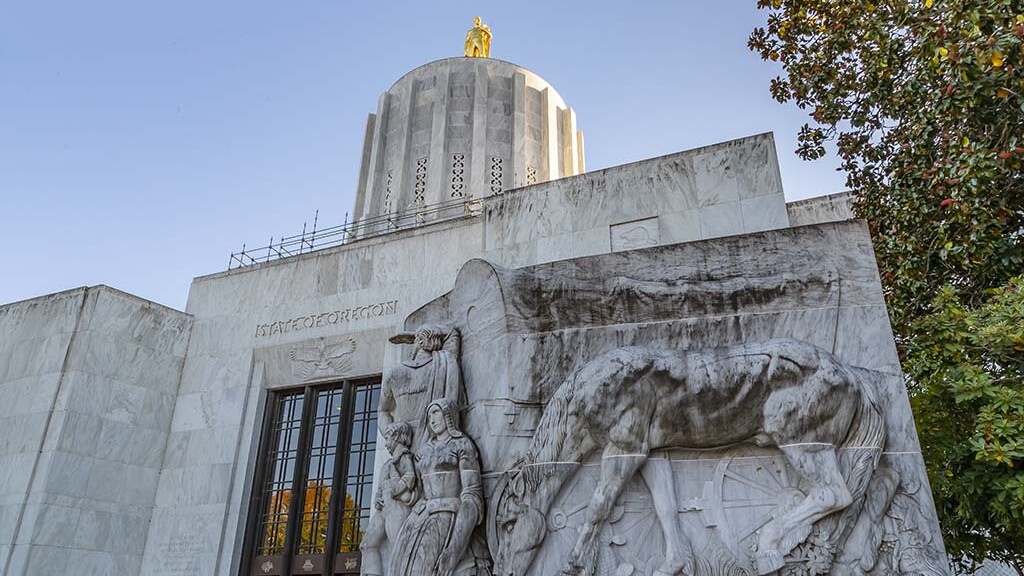
Aug 28, 2023 | AOC Advocacy
“Aid & Assist” Community Restoration Liability Study Underway
Work with the Oregon Department of Administrative Services (DAS) to study and recommend solutions to third party liability for community “aid and assist” community restoration services began at an initial meeting hosted by AOC on August 16. DAS risk staff are leading a study of the issue with help from county risk and legal experts and providers of community restoration services. The study report, along with recommended solutions, is due to the Legislature by February 1, 2024 thanks to the leadership of Senator Kate Lieber, the Governor’s office, and the coalition of counties and providers who crafted the language and budget note in SB 5506. In addition to the required study and recommendations, the legislature also set aside $2.9M to reimburse a county or its contracted provider for expenses resulting from litigation related to community restoration services.
Liability risk to counties and their providers related to the provision of community restoration services is a new and potentially catastrophic phenomenon arising from recent changes to state policy which aim to place as many individuals as possible in the community instead of the Oregon State Hospital where historically those services were exclusively provided. Eliminating the risk shift to counties arising from court-mandated community behavioral health services was a top 2023 legislative session priority for AOC.
Update on Statewide Homelessness Emergency Response and Technical Assistance NOFA
Disbursement of the $26M to expand homelessness emergency response statewide allocated in HB 5019 this past session is close to being decided by Oregon Housing and Community Services. About $6M will fund new shelter capacity for chosen projects from an RFP process, with the remainder to be divided among Local Planning Groups who responded to an RFP for rapid rehousing activities. Announcement of grant awards is expected in September. The Homeless Housing Response and Capacity Strengthening Notice of Funding Availability (NOFA) aimed at providing needed technical assistance to Balance of State communities has extended its pre-application deadline to August 25.
Governor Names New Emergency Management Director
Governor Kotek has named Erin McMahon as the new head of the Oregon Department of Emergency Management. She will take the place of acting director Matt Garrett who has overseen the rollout of the statewide homelessness emergency response alongside Oregon Housing & Community Services Director Andrea Bell. Both Director Garrett and Director Bell have met at least monthly since the Governor’s emergency declaration with AOC staff and the Local Government Advisory Committee for Health & Human Services to facilitate communication and problem solve rollout logistics.
Contributed by: Jessica Pratt | Legislative Affairs Manager
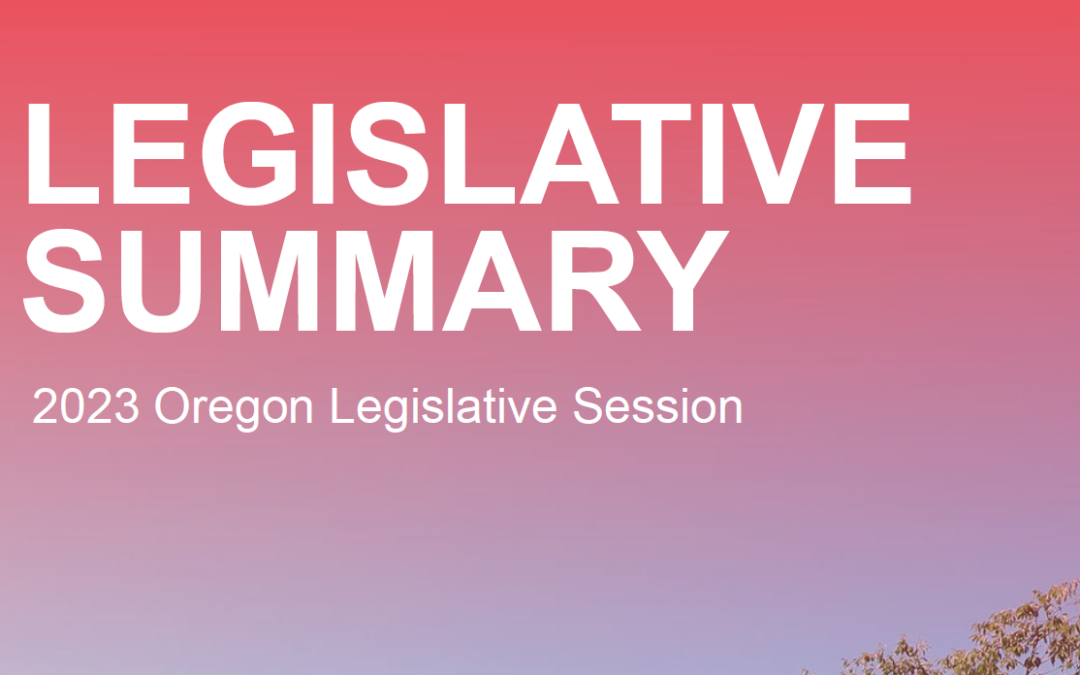
Aug 17, 2023 | AOC Advocacy, AOC News
The 2023 AOC Legislative Summary is a comprehensive report that describes the outcomes of the Association of Oregon Counties’ top legislative priorities and provides a detailed overview of each piece of legislation on which the AOC Legislative Committee took a position during Oregon’s 82nd Legislative Assembly.
Over 2000 bills were introduced this session and 697 were passed into law. The AOC Legislative Affairs Team lobbied for/against 189 concepts and submitted fiscal impact statements on over 500 proposals with potential impact to county budgets.
The strategic input, lobbying efforts, and technical expertise from commissioners, chairs, judges, and county staff this session was critical to AOC’s ability to advocate successfully on behalf of all of Oregon’s counties in the State Capitol. Together we secured significant policy and budgetary wins, built meaningful relationships with key state leaders, and advanced the state-county partnership.
The AOC Legislative Summary was emailed to the membership in PDF form, a hard copy was mailed to each county, and it can be found at www.orgeoncounties.org.
Click here to view the 2023 AOC Legislative Summary.
Contributed by: Mallorie Roberts | Legislative Affairs Director
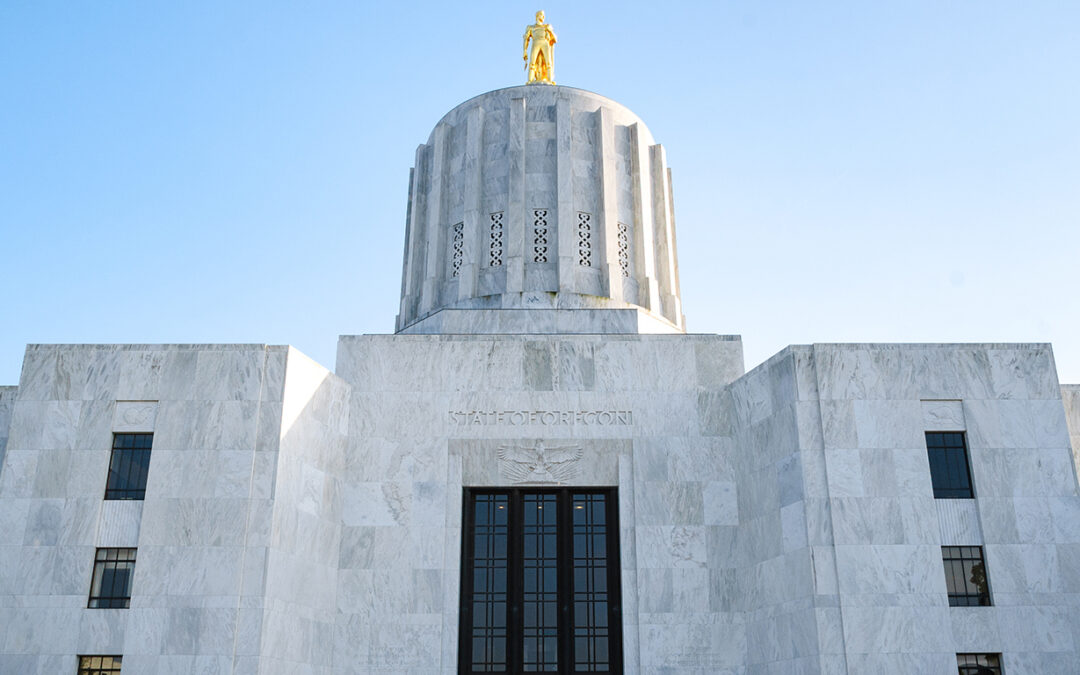
Jun 26, 2023 | AOC Advocacy, AOC News
The 82nd Legislative Assembly adjourned sine die on June 25, 2023 after a whirlwind of productivity during the initial four months followed by an historic six week stalemate. Under leadership from AOC policy steering committees and AOC Legislative Committee, members and staff spent the last six months advocating for AOC’s 2023 legislative priorities, negotiating away threats to county budgets and services, and securing significant policy wins and funding for counties.
This year saw a newly elected governor and administration, new leadership in both the House and Senate, and a large majority of freshmen legislators. Recognizing this as both an opportunity and a challenge, AOC prioritized meaningful relationship development this session. AOC President Derrick DeGroot and AOC Executive Director Gina Nikkel spent time over the last six months with Governor Kotek and staff, House Speaker, House and Senate Majority and Minority Leader offices, and key committee leadership.
“Politics is a person-to-person business,” said President DeGroot. For AOC and counties to achieve more influence and impact in Salem, we have to spend time developing long-term relationships and implementing thoughtful, productive strategy.”
Notable AOC wins this session include:
- HB 2101A – Surface Transportation Block Grant Fund Exchange Program stability
- HB 3201 – Critical updates to broadband statutes to secure nearly $900M in federal funding
- SB 80A – Improved Dept of Forestry/county engagement process on wildfire hazard map
- HB 2010A – Place based water planning and drought resources
- Interim work group on aid and assist liability mitigation and a risk fund
- SB 344A – Reauthorization of the Justice Reinvestment Initiative
The AOC legislative affairs team lobbied for/against over 180 bills this session, analyzed and submitted fiscal impact statements on over 500 bills, and secured interim legislative workgroup commitments for priorities that did not pass this session.
Details on every bill on which the AOC Legislative Committee took a position will be included in the AOC Legislative Session Report, published in the coming weeks. Please join the upcoming virtual meetings of the AOC Steering Committees for a deeper dive into policy and budget outcomes.
Contributed by: Mallorie Roberts, AOC legislative affairs director

Jun 26, 2023 | AOC Advocacy, AOC News, Governance, Revenue, & Economic Development
House Bill 2009 became the vehicle for negotiations that began early in session about several economic development and tax incentive programs long supported and utilized by counties. Negotiations centered on policy differences about the importance of these locally-driven tools to attract businesses to areas that need development and the alternative viewpoint that the subsidies in these programs needlessly reduce local revenues that could be used for other services, in particular schools.
AOC supported the efforts to keep these incentives as strong as possible and worked with other stakeholders, including the Oregon Economic Development Association and League of Oregon Cities to keep the programs intact.
After weeks of negotiation, public hearing testimony and advocacy from AOC members, and multiple rounds of amendments, a -15 amendment to HB 2009 was finally adopted and now goes to the governor for signature.
The compromise legislation does the following:
- Reinstates the research and development tax credit, which was discontinued by the legislature in past years
- Tax credit is in effect for 5 years, the percentage is 15 percent of the investment, and the maximum credit per taxpayer is $4 million
- Extends the Enterprise Zone and Long-term Rural Enterprise Zone programs through 2032
- “Fulfillment centers” are no longer eligible
- Increases the eligibility threshold for projects in the strategic investment program and indexes the eligibility threshold and the taxation threshold
- Adds a new “school impact fee” to the Enterprise Zone program
- Extends the Gain Share program through 2030
- Adds transparency and notice requirements
The most concerning part of HB 2009 for AOC was the addition of the new school impact fee. Fortunately, the initial proposal was negotiated down to be imposed only in years four and five for regular Enterprise Zones and year six for Long-term Rural Enterprise Zones. The fee will be negotiated between the school district and the zone sponsor and be between 15 percent and 30 percent of the property taxes that would otherwise be paid. Each fee negotiated would apply to all subsequent agreements.
Contributed by: Anna Braun, AOC contract lobbyist






